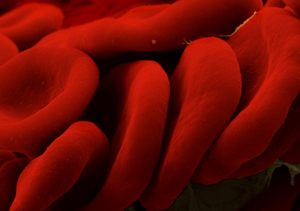Physician-Scientists Chart Connection Between Testosterone Therapy and Polycythemia Among HIV-Infected Patients

Photo courtesy of NSF
November 9, 2011
Drs. Carlos Vaamonde and Marshall Glesby, Department of Medicine, working with Dr. Charles Kyriakos Vorkas, University of North Carolina, published a study in AIDS that identifies a connection between the use of testosterone replacement therapy (TRT) and the blood disorder polycythemia among HIV-infected men. This is the first study on polycythemia in HIV-infected men and has led to additional recommendations for the treatment of patients with HIV.
Two Weill Cornell Department of Medicine physician-scientists, Drs. Carlos Vaamonde and Marshall Glesby, working with Dr. Charles Kyriakos Vorkas (a WCMC graduate and currently a resident at the University of North Carolina), recently published a study in the journal AIDS that identifies a connection between the use of testosterone replacement therapy (TRT) and the blood disorder polycythemia among HIV-infected men. This study, the first investigating polycythemia in HIV-infected men, provides clinicians with an additional guidepost in the treatment of patients with HIV.
Drs. Glesby, Vaamonde, and Vorkas published their findings in the October 15, 2011 edition of the journal AIDS. They note that while HIV infection can be accompanied by hematologic disorders such as anemia, thrombocytopenia, and granulocytopenia, reported cases of polycythemia associated with HIV are rare. However, there is an observed association between the use of TRT and occurrences of polycythemia. (Polycythemia is a blood disorder that occurs when the bone marrow is producing too many red blood cells.) Drs. Glesby, Vaadmonde, and Vorkas sought to explore if the connection between TRT and polycythemia could be seen in patients with HIV.
The doctors conducted a retrospective case-study at the Center for Special Studies (NYP/Weill Cornell), a multi-disciplinary clinic created in 1988 for patients with HIV/AIDS. The doctors used de-indentified data - meaning the private and personal information was removed before research access was granted - from between 1988 and 2008. From a sample size of over 6,000 men and women, 25 (21 men, 4 women) were positive for polycythemia. Testosterone use was associated with polycythemia, with intramuscular use showing a stronger correlation than topical application. Five of the 21 (24%) polycythemia cases did not use testosterone and in 10% there was no documented reason for the appearance of polycythemia. In the remaining cases, high testosterone emerged as the most plausible explanation for the appearance of polycythemia.
A retrospective study such as this has limitations - for example, the study did not allow for a way to explore the connection between the role of HIV infection itself and polycythemia. The findings, however, have caused the doctors to encourage HIV-infected patients taking testosterone to undergo regular hematological screening to monitor hemoglobin levels. They also encourage that patients with polycythemia be queried about testosterone use.
For more detail:
http://www.aidsmeds.com/articles/HIV_testosterone_polycythemia_1667_21376.shtml
Journal Article citation at PubMEd
http://www.ncbi.nlm.nih.gov/pubmed/22008652
Center for Special Studies
http://centerforspecialstudies.com/